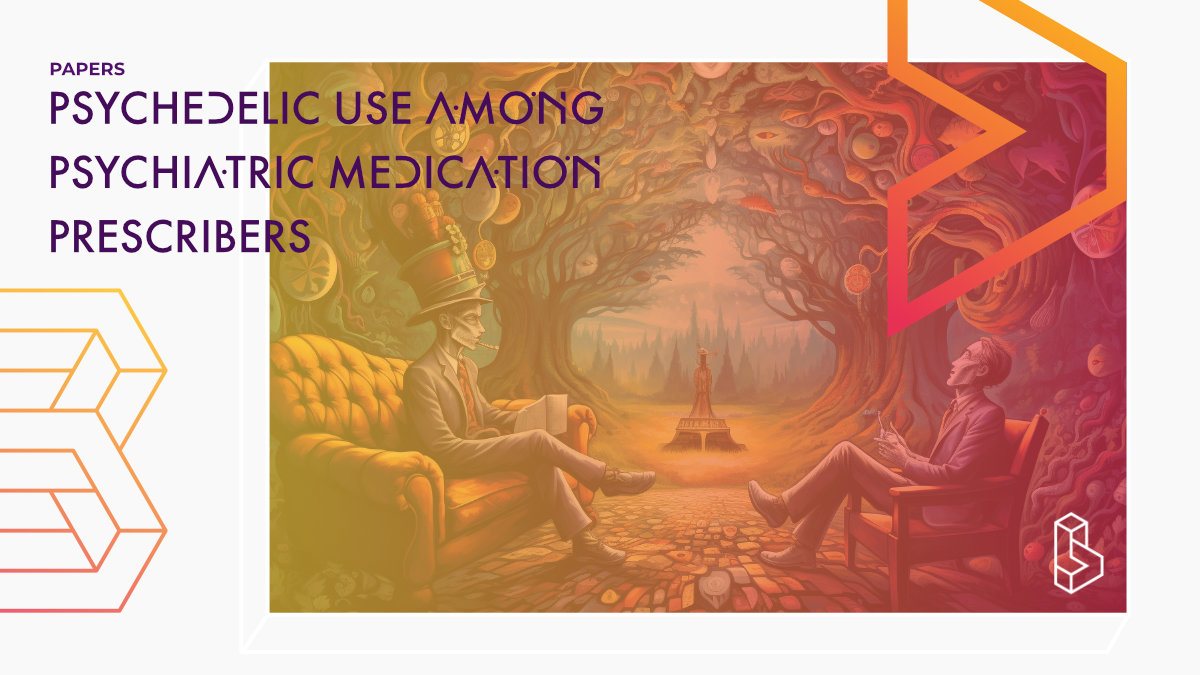This cross-sectional online survey (n=228) examined the effects of psychedelic use on healthcare providers who treat psychiatric disorders with medications. The study found that psychedelic use was associated with improvements in depression, anxiety, well-being, and resilience, and a decrease in reported suicidality. A factor analysis indicated that a combination of mystical, interpersonal, and personal experiences predicted these improvements. The preferred psychedelic agent did not influence outcomes, and frequency of use showed varied effect sizes. While 13.2% (n=30) reported at least one harm from psychedelic use, the results suggest potential benefits for healthcare providers, consistent with findings from other studies on the general population.
Abstract of Psychedelic Use Among Psychiatric Medication Prescribers
“Mental health problems including depression, anxiety, suicide, and burnout are common among health care providers. Resilience and well-being are factors thought to protect against these incidents. Clinical trials and naturalistic studies of psychedelic compounds have shown decreases in depression, anxiety, and suicidality while suggesting improvements in well-being. This secondary analysis of a large cross-sectional online survey consisting of participants with at least one lifetime psychedelic use sought to examine how use affects health care providers who treat psychiatric disorders with medications. In total, 228 respondents retrospectively completed measures of depression, anxiety, and well-being before and after psychedelic exposure. They also reported lifetime use, harms attributed to use, and preferred psychedelic agent. Psychedelic use was associated with improvements in depression, anxiety, and well-being. Reported suicidality decreased and resilience increased. A factor analysis suggested that a cluster of mystical, interpersonal, and personal items predicted improvement in depression, anxiety, well-being, suicidality, and resilience. Preferred psychedelic agent did not affect outcomes. Frequency of use was not associated with outcomes although differences in effect sizes were seen. Harm reported was consistent with the general population, with 13.2% (n = 30) reporting at least one harm. Pre-exposure alcohol use, aggressive impulses, and desire to die by suicide improved most often while marijuana use most often worsened or did not change. These results are consistent with clinical trials and naturalistic studies examining psychedelic use in the general population and suggest that health care providers who treat psychiatric disorders with medications may benefit from psychedelic use, although some harm was reported. Given the current mental health crisis among health care providers, further research is warranted to examine whether interventions utilizing psychedelics could improve well-being and effectiveness of health care providers while decreasing adverse mental health outcomes associated with working in health care.“
Authors: Zachary Herrmann, Adam W. Levin, Steven P. Cole, Sarah Slabaugh, Brian Barnett, Andrew Penn, Rakesh Jain, Charles Raison, Bhavya Rajanna & Saundra Jain
Find this paper
https://doi.org/10.1089/psymed.2023.0030
Paywall | Google Scholar | Backup | 🕊
Cite this paper (APA)
Herrmann, Z., Levin, A. W., Cole, S. P., Slabaugh, S., Barnett, B., Penn, A., ... & Jain, S. (2023). Psychedelic Use Among Psychiatric Medication Prescribers: Effects on Well-Being, Depression, Anxiety, and Associations with Patterns of Use, Reported Harms, and Transformative Mental States. Psychedelic Medicine.
Study details
Topics studied
Population Surveys
Study characteristics
Survey
Participants
228
Humans
Authors
Authors associated with this publication with profiles on Blossom
Charles RaisonCharles "Chuck" L. Raison is an American psychiatrist and professor of psychiatry. Next to his academic affiliation, he is also affiliated with the Usona Institute.
Linked Clinical Trial
Psychedelics and Wellness Study (PAWS)The Psychedelics and Wellness Study (PAWS), is an anonymous online survey investigating the interrelationship between psychedelics and wellness. The study population is adults ages 18 and older that have taken a psychedelic at least once. The maximum sample size is 5,000 survey respondents. It is expected that this anonymous online survey will support the hypothesis that there is a robust interrelationship between past psychedelic use and its impact on wellness.

